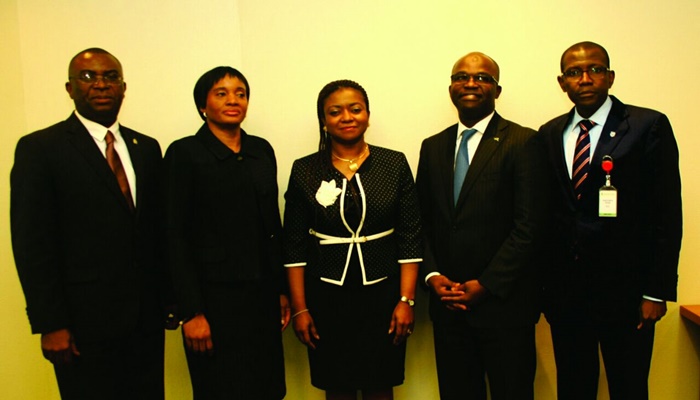
- Says no Nigerian bank in crisis
In a bid to manage the demand for foreign exchange among Nigerians, the Bankers Committee at the end of its 329th meeting on Wednesday in Lagos has ratified decision of the Central Bank of Nigeria (CBN) to begin the enforcement of the $50,000 annual limit.
Briefing financial journalists at the end of the meeting in Lagos, the committee said the decision will prevent many Nigerians who have been breaching the directive given in April 2015 by the CBN.
The committee comprises of chief executive officers of commercial banks in the country and directors of the nation’s apex bank, the Central Bank of Nigeria (CBN).
Speaking on behalf the committed, Director, Banking Supervision of the Central Bank of Nigeria, Mrs. Tokunbo Martins, said it has been noticed that people have not been complying with the directive and that the meeting decided that it was time to begin the enforcement of the directive.
The decision to reduce the limit was taken at the meeting of the Bankers Committee in April 2015 after it was realised that people were using the cards in a manner they were not expected to use them. The meeting then also noticed some arbitrage going on and in order to continue to support the stability in the foreign exchange market, it recommended the reduction.
Her words: “You will recall that some time ago CBN said it would manage demand on forex, there was a rule that was put in place that people are not allowed to withdraw more than $50,000 across the industry on the naira debit card. For a while now people have been breaching that rule.
The circular in April 2015 stated: “All authorised dealers and the general public are hereby informed that with effect from the date of this circular (13th April 2015) the existing limit on the usage of the naira denominated cards for transactions overseas has been reviewed downward.
“Accordingly, the limit has been reduced from $150,000 to $50,000 per person, per annum. In addition, authorised dealers are to ensure that the daily cash withdrawal limit embedded in the cards per person, per day is pegged at $300. Authorised dealers are to ensure strict compliance with this new limit and render monthly returns of the transactions.”
Martins, while speaking on steps taken to prevent people from continued breaching of the directive, said the meeting has decided that the right time to stop the arbitrage is now.
Her words: “All our cards are linked to a BVN and if people continue to breach the rule, they will lose access foreign exchange from their naira denominated cards”.
In a bid to manage the demand for foreign exchange among Nigerians, the Bankers Committee at the end of its meeting has ratified decision of the Central Bank of Nigeria (CBN) to begin the enforcement of the $50,000 annual limit.
The committee said the decision will prevent many Nigerians who have been breaching the CBN directive.
Answering journalists question on the allegation that some Nigerian banks are in financial crisis, Martins also stated that contrary to reports in the media that some banks in the country are insolvent, banks have strong buffers to weather crisis.
“I can tell you that that report is false. That seven banks are undercapitalized is absolutely not true, now that is not to say that the banking sector is not having headwind but so it is every other jurisdiction, it is not strange.
“So NPLs at 11 percent that is not what we need to focus on. What we need to ask is if the banks have the capacity to absorb the problems arising from those loans. The answer is yes, they do. They have very strong capital buffers. The banks have very huge capacity to generate income. So apart from the capital buffer they already have, they also have the capacity to generate income to also absorb those losses if they do arrive.
“If you look at other jurisdictions that are going through the same thing we are going through, they are also experiencing the same thing. There are jurisdictions that have NPLs as high as 15 per cent and 35 percent. Some countries in Europe have NPL as high as 18 per cent. So I think we need to ignore it entirely”.
In June the central bank dropped its peg of the naira against the dollar, prompting the local currency to depreciate by 40 percent, further hitting consumers’ spending power.
The non-performing loan (NPL) rate in the banking sector hit 11.7 percent in the first half of 2016, well above the central bank’s 5 percent limit, and it has forecast a further rise in the second half.
NPL’s stood at 5.3 percent at the end of last year. Loans to the oil and gas sectors accounted for almost a third of total bank lending, the central bank said in its half-year financial stability report.
The fall in oil prices since mid-2014 has forced Nigerian lenders, which have long focused on loans to the energy sector, to adapt their business models.
In July, the central bank sacked the management of Skye bank, Nigeria’s eighth biggest, for failing to meet minimum capital requirements.
Picture Caption:
L-R: Isaac Okorafor, Acting Director, Corporate Communications Department, Central Bank of Nigeria (CBN); Cathy Echeozo, Deputy Managing Director, Guaranty Trust Bank Plc; Tokunbo Martins, Director, Banking Supervision Department, CBN; Tokunbo Abiru, Managing Director, Skye Bank Plc; and Yinka Sanni, Chief Executive officer, Stanbic IBTC Bank, after a meeting of the Bankers’ Committee in Lagos on Wednesday.







Comments are closed.